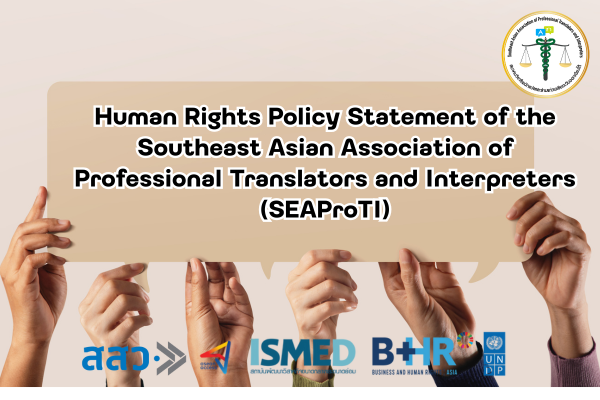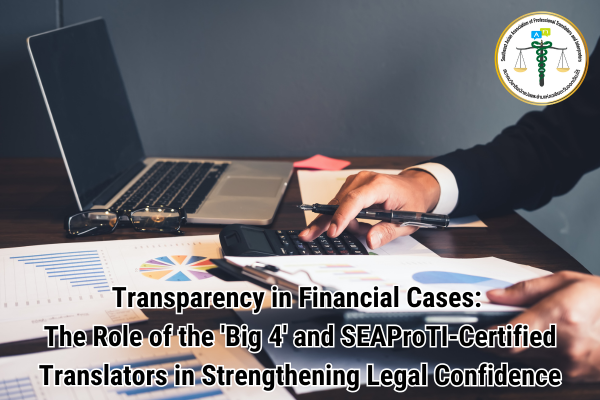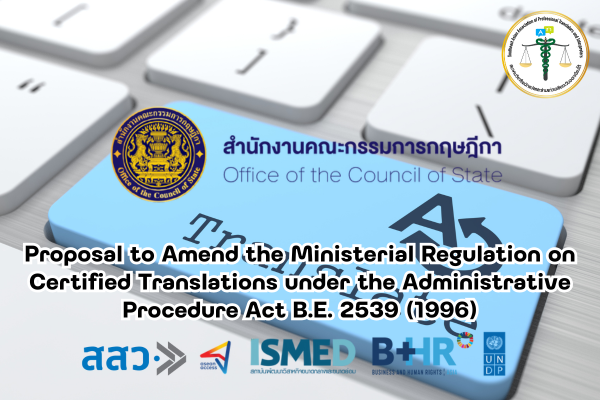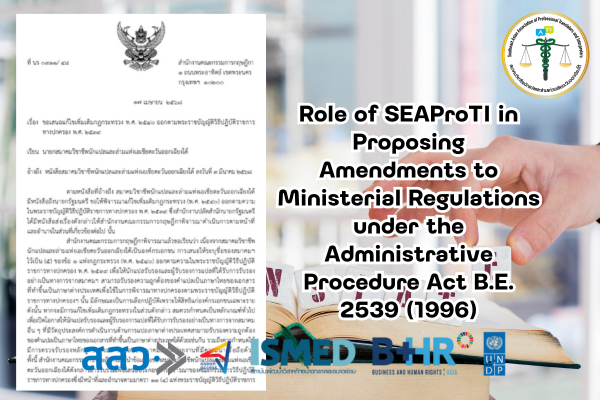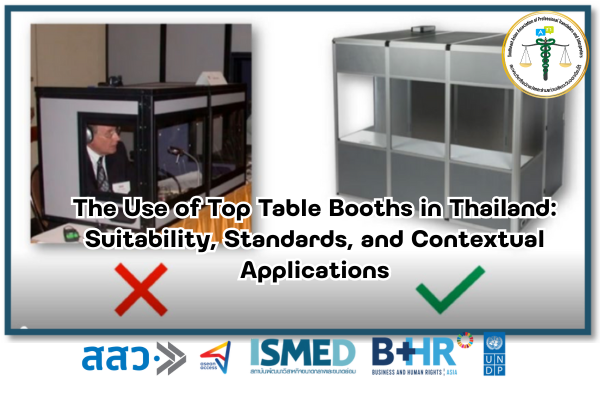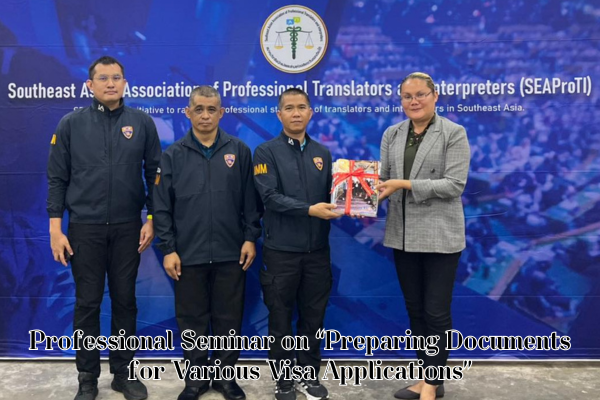Human Rights Policy Statement of the Southeast Asian Association of Professional Translators and Interpreters (SEAProTI)
The Southeast Asian Association of Professional Translators and Interpreters (SEAProTI) recognizes the critical role that language professionals play in promoting and protecting human rights. Whether facilitating access to information, justice, education, or public services or supporting the work of our members across the region, the Association is firmly committed to operating in accordance with the highest ethical standards.
SEAProTI is guided by the United Nations Guiding Principles on Business and Human Rights (UNGPs) and is committed to upholding the principles of accountability, transparency, and respect for human dignity in all aspects of its work.
To ensure our operations align with this commitment, SEAProTI outlines the following principles:
1. Responsibility to Respect Human Rights
SEAProTI is dedicated to encouraging all its members to respect the human rights of all stakeholders, including clients, service recipients, partners, and affected communities. The Association also supports the use of language to advance equity, justice, and non-discrimination.
2. Human Rights Due Diligence
The Association will continuously review and assess human rights impacts associated with its activities and those of its members. It will establish appropriate preventive measures to manage risks fairly and per the rule of law.
3. Stakeholder Engagement
SEAProTI values the input of all stakeholders in shaping policies and practices related to human rights. The Association will provide accessible and inclusive communication channels for all service users, including those with language or communication barriers.
4. Promoting Knowledge and Awareness
SEAProTI will provide training and organize knowledge-sharing forums on human rights in the context of translation and interpreting. These initiatives aim to raise awareness among members and reinforce a professional culture that genuinely respects human rights.
5. Grievance Mechanisms and Remedy
SEAProTI will establish effective, transparent, and fair mechanisms for receiving complaints and resolving disputes. These mechanisms will support appropriate investigation and remedy in cases involving potential human rights violations.
SEAProTI reaffirms its commitment to operate with respect for human rights and to empower the language services profession to play a constructive role in building a more equitable and just society.
Wanitcha Sumanat
President, Southeast Asian Association of Professional Translators and Interpreters (SEAProTI)
5 April 2025
SEAProTI’s certified translators, translation certification providers, and certified interpreters:
The Southeast Asian Association of Professional Translators and Interpreters (SEAProTI) has officially announced the criteria and qualifications for individuals to register as “Certified Translators,” “Translation Certification Providers,” and “Certified Interpreters” under the association’s regulations. These guidelines are detailed in Sections 9 and 10 of the Royal Thai Government Gazette, issued by the Secretariat of the Cabinet under the Office of the Prime Minister of the Kingdom of Thailand, dated July 25, 2024, Volume 141, Part 66 Ng, Page 100.
To read the full publication, visit: the Royal Thai Government Gazette
แถลงการณ์นโยบายสิทธิมนุษยชนของสมาคมวิชาชีพนักแปลและล่ามแห่งเอเชียตะวันออกเฉียงใต้
สมาคมวิชาชีพนักแปลและล่ามแห่งเอเชียตะวันออกเฉียงใต้ (SEAProTI) ตระหนักถึงบทบาทสำคัญของภาควิชาชีพด้านภาษาในการส่งเสริมและคุ้มครองสิทธิมนุษยชน ทั้งในฐานะผู้ให้บริการภาษาที่เกี่ยวข้องกับการเข้าถึงข้อมูล กระบวนการยุติธรรม การศึกษา และบริการสาธารณะ และในฐานะองค์กรที่สนับสนุนการดำเนินงานของสมาชิกทั่วทั้งภูมิภาค
สมาคมฯ ยึดมั่นในหลักการแนวทางของสหประชาชาติว่าด้วยธุรกิจและสิทธิมนุษยชน (United Nations Guiding Principles on Business and Human Rights – UNGPs) และมุ่งมั่นดำเนินงานภายใต้หลักความรับผิดชอบ ความโปร่งใส และการเคารพศักดิ์ศรีความเป็นมนุษย์
เพื่อให้การดำเนินงานของสมาคมเป็นไปอย่างมีจริยธรรมและสอดคล้องกับพันธสัญญาดังกล่าว สมาคมฯ จึงกำหนดแนวทางปฏิบัติดังต่อไปนี้:
1. ความรับผิดชอบต่อสิทธิมนุษยชน
สมาคมฯ จะส่งเสริมให้สมาชิกทุกคนเคารพสิทธิมนุษยชนของทุกภาคส่วนที่เกี่ยวข้อง ทั้งลูกค้า ผู้รับบริการ พันธมิตร และชุมชนท้องถิ่นที่ได้รับผลกระทบจากงานด้านภาษา รวมถึงสนับสนุนการใช้ภาษาเพื่อส่งเสริมความเสมอภาค ความเป็นธรรม และการไม่เลือกปฏิบัติ
2. การประเมินผลกระทบและการจัดการความเสี่ยง
สมาคมฯ จะดำเนินการทบทวนและประเมินผลกระทบด้านสิทธิมนุษยชนที่เกี่ยวข้องกับกิจกรรมของสมาคมและการดำเนินงานของสมาชิก พร้อมกำหนดมาตรการป้องกันความเสี่ยงที่เหมาะสม โดยยึดหลักความเป็นธรรมและหลักนิติธรรม
3. การมีส่วนร่วมของผู้มีส่วนได้เสีย
สมาคมฯ ให้ความสำคัญกับการมีส่วนร่วมของผู้มีส่วนได้เสียทุกกลุ่มในการกำหนดนโยบายและแนวทางที่เกี่ยวข้องกับสิทธิมนุษยชน โดยจะเปิดช่องทางการสื่อสารที่หลากหลายและเป็นมิตรกับผู้ใช้บริการทุกกลุ่ม รวมถึงกลุ่มผู้มีข้อจำกัดทางภาษา
4. การส่งเสริมความรู้และจิตสำนึก
สมาคมฯ จะจัดให้มีการอบรมและเวทีแลกเปลี่ยนความรู้เกี่ยวกับสิทธิมนุษยชนในบริบทของการแปลและการล่าม เพื่อยกระดับจิตสำนึกของสมาชิก และเสริมสร้างความเข้าใจในมาตรฐานวิชาชีพที่เคารพสิทธิมนุษยชนอย่างแท้จริง
5. กระบวนการร้องเรียนและการเยียวยา
สมาคมฯ จะจัดให้มีกลไกการรับเรื่องร้องเรียนและการแก้ไขข้อพิพาทที่มีประสิทธิภาพ โปร่งใส และเป็นธรรม เพื่อให้สามารถตรวจสอบและเยียวยากรณีที่อาจเกี่ยวข้องกับการละเมิดสิทธิมนุษยชนได้อย่างเหมาะสม
สมาคมวิชาชีพนักแปลและล่ามแห่งเอเชียตะวันออกเฉียงใต้ขอยืนยันเจตจำนงที่จะดำเนินงานโดยยึดถือคุณค่าของสิทธิมนุษยชนและสนับสนุนให้ภาควิชาชีพภาษามีบทบาทเชิงบวกในการสร้างสังคมที่เท่าเทียมและมีความยุติธรรม
วณิชชา สุมานัส
นายกสมาคมวิชาชีพนักแปลและล่ามแห่งเอเชียตะวันออกเฉียงใต้ (SEAProTI)
5 เมษายน 2568
เกี่ยวกับนักแปลรับรอง ผู้รับรองการแปล และล่ามรับรองของสมาคมวิชาชีพนักแปลและล่ามแห่งเอเชียตะวันออกเฉียงใต้
สมาคมวิชาชีพนักแปลและล่ามแห่งเอเชียตะวันออกเฉียงใต้ (SEAProTI) ได้ประกาศหลักเกณฑ์และคุณสมบัติผู้ที่ขึ้นทะเบียนเป็น “นักแปลรับรอง (Certified Translators) และผู้รับรองการแปล (Translation Certification Providers) และล่ามรับรอง (Certified Interpreters)” ของสมาคม หมวดที่ 9 และหมวดที่ 10 ในราชกิจจานุเบกษา ของสำนักเลขาธิการคณะรัฐมนตรี ในสำนักนายกรัฐมนตรี แห่งราชอาณาจักรไทย ลงวันที่ 25 ก.ค. 2567 เล่มที่ 141 ตอนที่ 66 ง หน้า 100 อ่านฉบับเต็มได้ที่: นักแปลรับรอง ผู้รับรองการแปล และล่ามรับรอง


